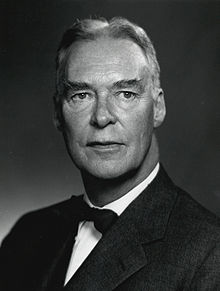Christian Herter | |
|---|---|
 | |
| 1st United States Trade Representative | |
| In office December 10, 1962 – December 30, 1966 | |
| President | John F. Kennedy Lyndon B. Johnson |
| Preceded by | Position established |
| Succeeded by | William M. Roth |
| 53rd United States Secretary of State | |
| In office April 22, 1959 – January 20, 1961 | |
| President | Dwight D. Eisenhower |
| Preceded by | John Foster Dulles |
| Succeeded by | Dean Rusk |
| 20th United States Under Secretary of State | |
| In office February 21, 1957 – April 22, 1959 | |
| President | Dwight D. Eisenhower |
| Preceded by | Herbert Hoover Jr. |
| Succeeded by | C. Douglas Dillon |
| 59th Governor of Massachusetts | |
| In office January 8, 1953 – January 3, 1957 | |
| Lieutenant | Sumner G. Whittier |
| Preceded by | Paul A. Dever |
| Succeeded by | Foster Furcolo |
| Member of the U.S. House of Representatives from Massachusetts's 10th district | |
| In office January 3, 1943 – January 3, 1953 | |
| Preceded by | George H. Tinkham |
| Succeeded by | Laurence Curtis |
| Speaker of the Massachusetts House of Representatives | |
| In office 1939–1943 | |
| Preceded by | Horace T. Cahill |
| Succeeded by | Rudolph King |
| Member of the Massachusetts House of Representatives from the 5th Suffolk district | |
| In office 1931–1943 | |
| Preceded by | Henry Lee Shattuck |
| Succeeded by | Henry Lee Shattuck |
| Personal details | |
| Born | Christian Archibald Herter March 28, 1895 Paris, France |
| Died | December 30, 1966 (aged 71) Washington, D.C., U.S. |
| Resting place | Prospect Hill Cemetery |
| Political party | Republican |
| Spouse |
Mary Pratt (m. 1917) |
| Education | Harvard University (BA) Columbia University |
| Signature | |
Christian Archibald Herter (March 28, 1895 – December 30, 1966) was an American diplomat and Republican politician who was the 59th Governor of Massachusetts from 1953 to 1957 and United States Secretary of State from 1959 to 1961. He served as president of the board of trustees at the Dexter School from 1937 to 1939. [1] His moderate tone of negotiations was confronted by the intensity of Soviet leader Nikita Khrushchev in a series of unpleasant episodes that turned the Cold War even colder in 1960–61.